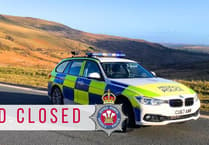Last week, this newspaper brought you the news that come April, consumers of gas in this region face the second highest increases in prices in Wales and the fourth in Britain. The average homeowner will see their bills increase by 79 per cent over last year’s prices – a wake-up call that will effect each and every one of us.
I am in the process of purchasing a new home near Aberystwyth, one that the builder assures me is extremely well-insulated. When the certification process is done, he anticipates it will have a B-rating. At least that should stop some of that shower from Insulate Britain gluing their ears to my front door in a protest over climate change.
But why do consumers here have to put up with such a high increase – higher than the rate of increase than those who live in Cardiff will receive?
As part of our reportage, we asked Ofgem to explain why power prices were so expensive in this part of Wales. We are still waiting for a detailed response. Instead, we were offered an extensive document dating back to 2015 on energy prices then. And the Ofgem spokesperson had this to say too: “We know that this is a very worrying time for consumers. The energy price cap has protected millions of customers on default tariffs from the full impact of the unprecedented increase in global gas prices this winter. It is too soon to predict the level of the price cap from April.
“Any customer worried about paying their energy bill should contact their supplier to access the range of support available.”
“We are unable to speculate on what future levels of the price cap could be.
“The price cap level from April will reflect the movement of wholesale gas prices we have seen between August and February.”
I don’t know what you think, but I think this is a load of hooey. Here’s a UK government body that is supposed to regulate and oversee the energy market, yet it can’t answer the most basic question of why are people paying so much here to heat their houses – both first ones and second homes alike.
If that isn’t enough to get your blood boiling, then consider that depending on where you fill up your vehicle with either diesel or petrol, chances are you are also paying more for your fuel at the pump than most other places in Wales or the UK.
In Aberystwyth, you will likely pay as much as 12 pence more per litre at the pump than if you filled up north of the River Dyfi or down south, closer to the M4 corridor.
Take Morrison’s as an example. I usually buy my fuel there because I believed it to be cheaper. Certainly up in Lancashire where I’m selling my house to buy here, Morrisons comes in 10p or so a litre cheaper than other regular petrol forecourts. Fill up in Morrisons in Aberystwyth and you’ll be paying around 7p more per litre than you would if you filled up in Morrisons of Newtown. Chances are the same tanker delivers fuel to both forecourts. That enough to drive you around the bend.
We live in a region of Wales where owning a vehicle is a necessity. Regular readers of this column will know my thoughts and observations of Transport for Wales and its inability to run a train service. By all accounts from those of you who share your experiences with me via email, the bus services are only marginally better.
We are literally at the end of the line and therefore have to pay more.
In the late spring of 2020, long before I had any idea that I would be coming to live and work here in mid Wales, I drove up from the ferry at Fishguard over to Buxton to see family. The A44 road at Goginan had temporary lights installed then for roadworks. You can imagine my surprise when, fast forward two years later, I’m driving the A44 to come down here and check out Aberystwyth before starting work in October, that the red light, green light game is still being played there. And nothing – not a thing – had been done to that same stretch of road. Small wonder then Cllr Rhodri Davies made the pages of the Cambrian News complaining that the A44 works were forgotten.
But no, Cllr Davies, it’s not just the A44. It’s the rest of this region too. So why we pay so much for so little?
I will make a prediction: There are council elections due this May, so expect to see a flurry or paving and roadworks underway. Nothing says your tax money is being well spent than some potholes filled and roads repaired, just in time for councillors to claim that they’ve been hard at work for you all along — and would like your support again at the ballot box. Don’t you just love the smell of fresh asphalt first thing in the morning?
For the best part of 10 years I worked in the Middle East. Forgive me, but I am rather cynical when it comes to the price of oil.
Right now, when it comes to prices at the petrol pump, you need to remember that for almost two years, you drove little and hardly filled your tank. Economic activity was barely ticking over – not just here, but pretty much everywhere else around the world. And the price of oil was low.
Basic economics is all about supply and demand. There was no demand then, hence low prices. But oil producers need to recuperate the money lost during those lean times. Now, the taps are turned tighter, supply is rarer, prices are higher. And you don’t need to be a spokesperson at Ofgem to know that.
I spent many weeks with rebels covering their fighting against the Gaddafi regime in Libya. Every time the fighting came near any oil installation, both sides used small arms to ensure the facilities were kept intact so that the petro-dollars would keep pouring in regardless of the outcome of the revolution.
One leading rebel figure had been a professor of archaeology and told me a story that he managed to convince Gadaffi to fund an expedition to recover a B-17 Liberator that had crash-landed in the Sahara some 500 kilometres south of Benghazi during the Second World War and was believed to be largely intact.
Because of international sanctions, there was no GPS equipment and, because of the makeup of the sand, the expedition couldn’t use compasses. Instead, they relied on local Tuareg tribesmen who navigated at night by the stars. And during the day, the Tuareg guides picked up sand and sniffed it to know where they were.
The professor was sceptical of this navigation by nose and quietly picked up sand and stuck it in his pocket. When the Tuareg stopped again to “smell” their bearing, the professor offered his handful of sand. The guide sniffed several times, looked confused, but then determined the expedition needed to backtrack for a couple of hours. They could smell where there was oil and where there was not.
Here in mid Wales, you’d be lucky to get a sniff of anything that might be deemed a break.
If only we had the energy…





Comments
This article has no comments yet. Be the first to leave a comment.